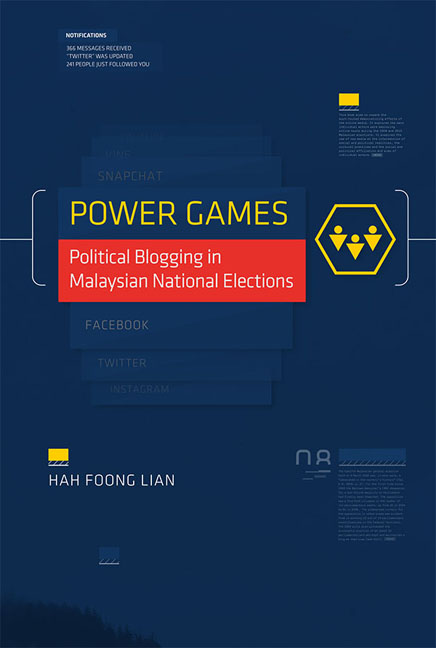Book contents
- Frontmatter
- Contents
- Acknowledgements
- List of Abbreviations of Political Parties
- Introduction
- Chapter 1 The Cultural, Social and Political Fabric of Malaysia
- Chapter 2 Trends in Social Media Use in Malaysian Cyberspace
- Chapter 3 A Political Marketing Tool and a Network of Cyber Battles
- Chapter 4 Psychological Warfare and Leadership Change
- Chapter 5 Negotiating Political Reform and Change
- Conclusion
- Bibliography
- Index
- About the Author
Chapter 2 - Trends in Social Media Use in Malaysian Cyberspace
Published online by Cambridge University Press: 05 July 2016
- Frontmatter
- Contents
- Acknowledgements
- List of Abbreviations of Political Parties
- Introduction
- Chapter 1 The Cultural, Social and Political Fabric of Malaysia
- Chapter 2 Trends in Social Media Use in Malaysian Cyberspace
- Chapter 3 A Political Marketing Tool and a Network of Cyber Battles
- Chapter 4 Psychological Warfare and Leadership Change
- Chapter 5 Negotiating Political Reform and Change
- Conclusion
- Bibliography
- Index
- About the Author
Summary
This chapter discusses the use of blogs and Facebook pages in the 2008 and 2013 general elections based on findings of the content analysis and in-depth interviews with the socio-political bloggers. It highlights the trends in blog use among the relatively distinct groups of socio-political bloggers and discusses some of the key findings within the prevailing political landscape in 2008 and 2013. This helps to contextualize and present a more comprehensive picture of the manners in which the online platform was used at particular moments in an election. The ways in which the online platform was utilized seems to reflect the particular social and political culture of Malaysian society.
Firstly, the content analysis confirmed the findings of previous studies about the dominant use of blogs and social media to mobilize readers for political action (Kahn and Kellner 2004; Perlmutter 2008; Pole 2009; Lim 2009) and to express dissenting or diverse views and opinions (Keren 2006; Kulikova and Perlmutter 2007; Lim 2009) that were largely ignored by the mainstream media. These online tools enabled socio-political bloggers to encourage blog readers to take part in protest rallies and to vote in the elections.
Electoral candidates who maintained blogs during this period were able to disseminate information about their campaign activities. However, the online platform was limited in generating public discussion of issues and policies that had an impact on society. An examination of the comments of readers showed that blogging did not appear to have generated discussion or engaged readers extensively in public discourse. Some research participants expressed fear of retribution because of comments made on their blogs, they thus took extra precautions to filter certain comments. They also indicated that Facebook pages were less conducive for discussing issues of public interest.
The Malaysian blogosphere was, expectedly, more sympathetic towards the opposition than the ruling coalition, given the tight control of the mainstream media by the ruling regime. But, more importantly, the results demonstrated that blogging could be used as a tool to sway public opinion1 in the elections. In the 2008 election the contents of blogs were generally critical of the BN government and specifically negative of the then prime minister Abdullah Ahmad Badawi.
- Type
- Chapter
- Information
- Power GamesPolitical Blogging in Malaysian National Elections, pp. 55 - 86Publisher: ISEAS–Yusof Ishak InstitutePrint publication year: 2016

